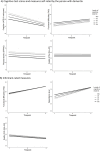Cognitive reserve and its impact on cognitive and functional abilities, physical activity and quality of life following a diagnosis of dementia: longitudinal findings from the Improving the experience of Dementia and Enhancing Active Life (IDEAL) study
- PMID: 39775724
- PMCID: PMC11705083
- DOI: 10.1093/ageing/afae284
Cognitive reserve and its impact on cognitive and functional abilities, physical activity and quality of life following a diagnosis of dementia: longitudinal findings from the Improving the experience of Dementia and Enhancing Active Life (IDEAL) study
Abstract
Background: The concept of cognitive reserve may explain inter-individual differences in susceptibility to neuropathological changes. Studies suggest that experiences over a lifetime impact on cognitive reserve, and it is hypothesised that following a dementia diagnosis, greater reserve levels are linked to accelerated disease progression.
Objective: To investigate the longitudinal impact of cognitive reserve on cognitive and functional abilities, physical activity and quality of life in people with dementia.
Design: Longitudinal cohort design.
Setting and participants: Participants were 1537 people with mild-to-moderate dementia at baseline, 1183 at 12 months follow-up and 851 at 24 months follow-up, from the IDEAL study.
Methods: A comprehensive latent measure of cognitive reserve incorporated domains from all stages of life: education, occupational attainment and later-life engagement in leisure activities. The impact of cognitive reserve on cognition, functional abilities, physical activity and quality of life at baseline and over time was investigated using latent growth curve modelling.
Results: Higher cognitive reserve was associated with better cognition, fewer functional difficulties, more physical activity and better quality of life at baseline but was associated with accelerated cognitive decline and greater dependence over time. After 2 years, those with higher initial reserve were estimated to still have better cognition than those with low reserve.
Conclusions: Cognitive reserve may be important in initially delaying dementia progression but is linked with accelerated deterioration once dementia becomes clinically evident, likely because of the more advanced neuropathological stage of the condition. Engagement in leisure activities is a potentially modifiable domain of cognitive reserve warranting further investigation.
Keywords: Alzheimer’s disease; cognition; education; leisure activities; older people.
© The Author(s) 2025. Published by Oxford University Press on behalf of the British Geriatrics Society.
Conflict of interest statement
None declared.
Figures


Similar articles
-
Functional reserve: The residual variance in instrumental activities of daily living not explained by brain structure, cognition, and demographics.Neuropsychology. 2021 Jan;35(1):19-32. doi: 10.1037/neu0000705. Neuropsychology. 2021. PMID: 33393797 Free PMC article.
-
The effects of cognitive reserve and lifestyle on cognition and dementia in Parkinson's disease--a longitudinal cohort study.Int J Geriatr Psychiatry. 2016 Jan;31(1):13-23. doi: 10.1002/gps.4284. Epub 2015 Mar 17. Int J Geriatr Psychiatry. 2016. PMID: 25781584
-
Association of lifelong exposure to cognitive reserve-enhancing factors with dementia risk: A community-based cohort study.PLoS Med. 2017 Mar 14;14(3):e1002251. doi: 10.1371/journal.pmed.1002251. eCollection 2017 Mar. PLoS Med. 2017. PMID: 28291786 Free PMC article.
-
Cognitive Reserve and the Prevention of Dementia: the Role of Physical and Cognitive Activities.Curr Psychiatry Rep. 2016 Sep;18(9):85. doi: 10.1007/s11920-016-0721-2. Curr Psychiatry Rep. 2016. PMID: 27481112 Free PMC article. Review.
-
Education and Cognitive Functioning Across the Life Span.Psychol Sci Public Interest. 2020 Aug;21(1):6-41. doi: 10.1177/1529100620920576. Psychol Sci Public Interest. 2020. PMID: 32772803 Free PMC article. Review.

